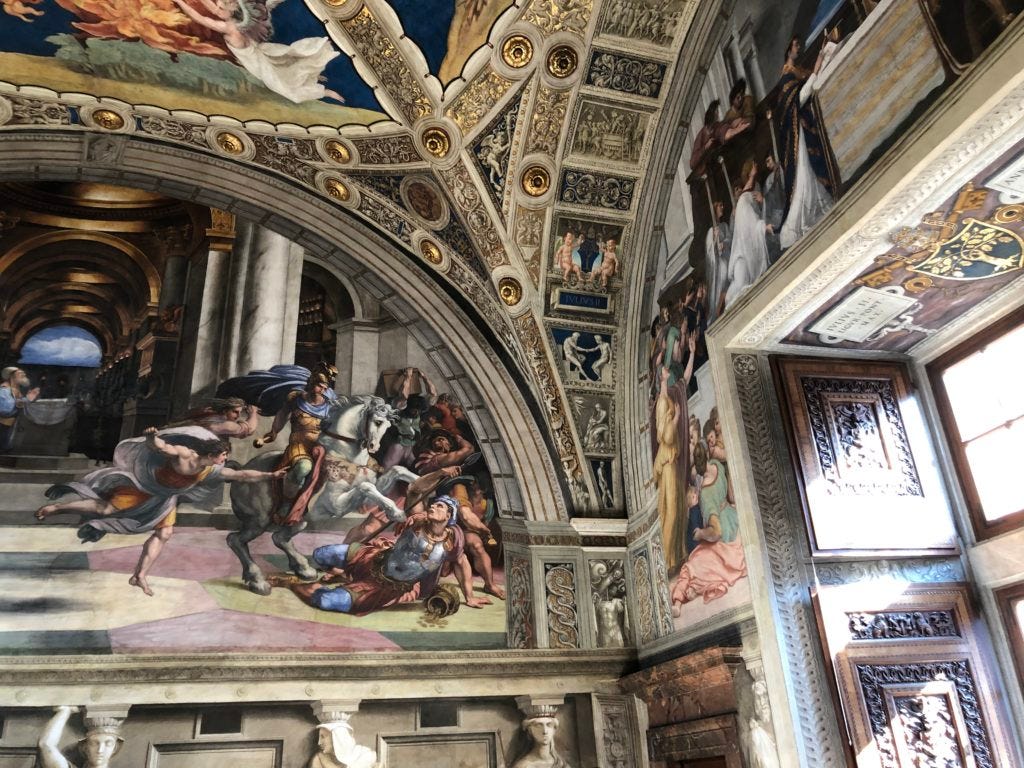Classic Style Intellectual Worlds

The photo above is one I recently took at the Vatican. For me, it illustrates some key principles of classic artistic style. This style tends to be a fractal collection of structures at different scales, structures that frame spaces of many different sizes. Each structure doesn’t use up all local space, but instead leaves open holes for other works of art. Most all space is used by art of some sort, but items that help define larger structures are more homogeneous.
For example, the key arches in this picture have some patterns within them, but these vary less in texture, style, color, and theme, so that the arch itself can be more clearly visible. A similar pattern happens for the art in the spaces between the arches: works in larger spaces can be more complex, with more variations in textures, styles, colors, and themes. In contrast, works in smaller spaces are more constrained to fit well into the patterns around them.
Higher status artists are allocated to fill the larger spaces, where artists are allowed more discretion. This is a sense in which status is correlated with creativity. But its not at all that all artists are being as creative as they can, with the highest status artists capable of the most creativity. Instead, artists are only allowed to be more creative when they are higher status. That is, we don’t so much like high status because that indicates an ability to be creative, we instead like to see creativity because that indicates that the creator was high status.
Now consider this as a metaphor for academia and related intellectual worlds. These worlds make many products that fit into many structures on many different scales, including fields, subfields, topics, theories, and methods. Imagine that the world mainly wants all these products to fit into a pleasing aesthetic structure with an overall classic artistic style. When an individual makes a product and proposes to put it in some particular place within this overall structure, that proposal is accepted or rejected largely on the basis of how well it improves the overall artistic composition.
If so, most individuals will be rewarded for making impressive small variations. For example, if lots of people are talking about how AI will soon take all the jobs, and how a UBI could solve that, then aspiring intellectuals are rewarded for talking about modest variations on such topics. It is not that hard to be very critical of such scenarios, or to talk about very different future problems and solutions. And yes that might create more social value in terms of intellectual progress. But talking about those things clashes with the rest of the conversation, and so doesn’t make as aesthetically pleasing a whole. So you’ll instead want to be the most witty, clever, articulate, inspiring, rigorous person who talks about relatively small variations on what others are talking about.
That is, as an aspiring intellectual, you should mainly imagine yourself bidding to make one of the tiny artworks in the picture above. You’ll need to both stand out in some way, but also make something that fits very closely with nearby works. You may be capable of far greatly creativity, which could lead to greater intellectual progress. At least if anyone were to listen to you, and be tempted to build on your work. But if you aren’t one of the most impressive people doing lots of stuff that fits aesthetically with what others are doing nearby, its quite likely that no one will listen to you.
If you succeed on that usual path, you may someday be allowed more creativity, to contribute something bigger. Perhaps even something that produces real intellectual progress. And then future historians may say yay, what a great system that gives the biggest rewards to the most creative, surely it must be designed to maximize intellectual progress. Which if you are paying attention, you’ll know to be bull. Though you’ll probably also know to keep quiet about, as most everyone around you prefers a more flattering view of how their world contributes to intellectual progress.


Here's what one of the world's best agents can do for a new artist: https://newyork.cbslocal.co...
Wow. Spoken of in such passive yielding outsider voice. Who are 'they' and why do you so badly need their approval? It seems to me many of the greatest have pursued their own course regardless of the obstacles, and no doubt it is much more difficult to strike your own path without the encouragement and support of others, but it needn't stop anyone. They either pursue it on their own or adapt sufficiently around the edges to allow them to do what they want in their own space. Many delude themselves with the greatness of their ideas, just think of all the cranks and charlatans with ideas no one bothers to listen to, flat earthers, creationism, conspiracy theorists, anti-vaxers, etc. There is much resistance to new ideas and when progress is measured by graves, longer lives don't necessarily bring faster progress, but the reason ideas need tying into one another is that is how they become testable and useful and ideas can only be displaced by better ones. There is another way to introduce them though, and that is through fiction